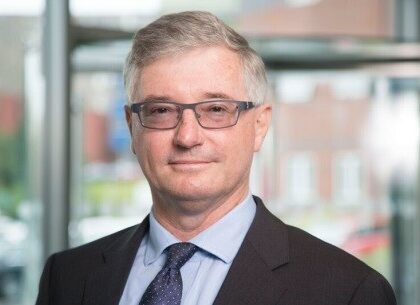
In this interview he discusses his experiences during his nearly 20 year career in the sector, reflecting upon what has changed and thinking through what might be on the horizon from university technology transfer in the midlands region and beyond.
A. I’d spent my career in industry; first being a corporate scientist/researcher myself; then managing R&D in large multinational companies; and finally investing in R&D as corporate venturing. As part of that I’d become an expert in working as an industrial partner with academics and scientists from universities and other technology institutes anywhere in the world that we felt could provide us with new insights and information. So, I really understood both the benefits and challenges of getting research out into the ‘real’ world. I was attracted to working on the university “side of the table” because I could combine my personal aim to do more than make returns for shareholders with the skill set I’d built up to that point in my career.
A. Externally, most outsiders and non-academics don’t understand at all how universities work. They see them as conventional large hierarchical entities and get frustrated by the lack of ‘organisation’. In fact, the best metaphor I’ve come up with for the organisational form of a university is that it’s a ‘village’, with a head chief, different feudal families and academics in the middle of it all as ‘sole traders’. So, if you imagine trying to ‘get something done’ in a village where you don’t live, you can start to understand why universities are difficult places for outsiders to comprehend.
Internally, when I started, the translation of research was seen as a nice-to-have niche activity for a few academics in the STEM subjects. Certainly, way down the list compared to teaching students and doing research. If senior management looked at it at all, it was mainly with a completely misguided view that somehow if only their intellectual property licensing staff would do a ‘better job’ (never defined), there were millions to be made from it. Even today, we have to spend a lot of time educating senior managers on the role of time and luck, as well as sound judgement and investment, to get financial returns.
A. Yes, there’s been significant long-term investment from Government of grants that support people doing these jobs on the interface between universities and users of their research. When I started, these ‘technology transfer’ roles had to find ways of getting enough return to pay for themselves every year. The consistent support funding has meant that most universities who get it have been able to attract and hold on to very professional and experienced staff doing these jobs. There’s also been consistent pressure for universities to demonstrate their contribution to the economy beyond the provision of qualified graduates and research papers. All this has made the activity gain more management attention and awareness internally. Having professionals on the side of universities has, of course, made life difficult for those who’d like to gain access to valuable knowledge for free.
A. Firstly, the language we use to explain what we do needs to change in order to be more inclusive. Words like “technology transfer” imply that non-STEM academics are excluded, which is far from the truth. A great example of this is that Science-based business plans talk about “markets” whilst the Arts & Humanities might talk about “audiences”. We need to use language that attracts and supports the translation of ideas right across the spectrum of research interests.
Secondly, we have a big role to play in helping our universities to support economic growth, especially in their local region. Government is looking to universities to demonstrate that all the research funding they receive is actually a significant national asset and driver of economic recovery. This is much more complex and challenging for us than the old model of creating a piece of intellectual property and taking it to market.
A. MICRA is an experiment in two parts: The first was to see what happens if we get a group of university ‘technology transfer’ offices to work closely together; and explore what we could make happen collectively that none of us could do alone. It’s exceeded all my private expectations in the amount of working together and interactions we’ve generated across the eight universities. It’s trained up a new cohort of both research commercialisation staff and academic researchers which can only be good for the translation of research in the Midlands. It also offers one possible platform and a working model for a more region-wide approach to the transfer of university research into economic benefits.
A. The second part of the MICRA experiment is to see if bringing together the research outputs from a group of universities and making that available to investors collectively can attract bigger and more ‘patient’ investment capital that we have been able to bring to the Midlands previously.
A. Despite the difficult situation at the moment I’m planning to take a ‘gap year’. If I can’t travel physically, I’ll travel mentally, catching up with books and articles I’ve intended to read, maybe taking some online courses, learning music theory and reaching out to old friends I’ve lost touch with. At home there’s always the family, guitar, garden and an old classic car to keep me busy! After that I’ll look for things to do that I’m really passionate about and actively interested in supporting.

Dr. James Wilkie